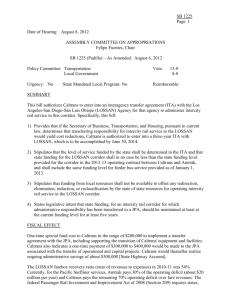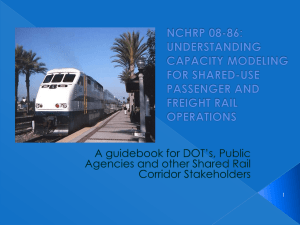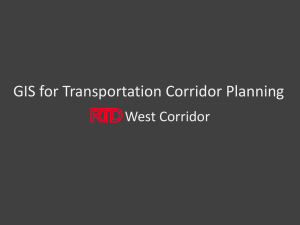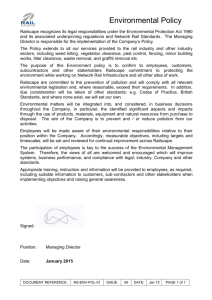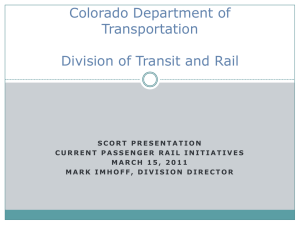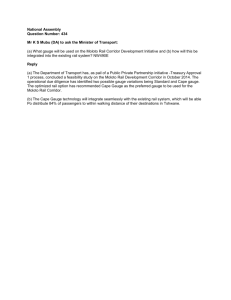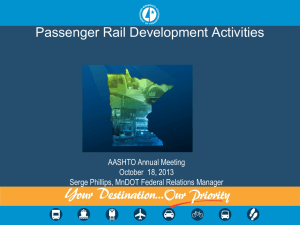Jennifer Bergener - Orange County Business Council
advertisement
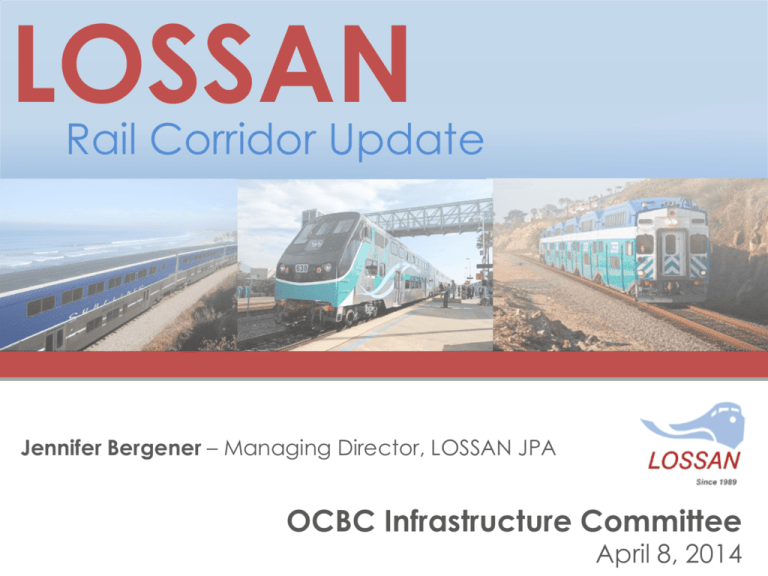
LOSSAN Rail Corridor Update Jennifer Bergener – Managing Director, LOSSAN JPA OCBC Infrastructure Committee April 8, 2014 Statewide Perspective • Three existing state-funded corridors • $109 million in annual state operating funds • 1 in 5 Amtrak passengers use California services • Annual ridership 5.5 million+ • Three emerging corridors LOSSAN Rail Corridor Current Service • • • San Diego – Los Angeles – San Luis Obispo 2nd busiest intercity passenger rail corridor in U.S. 100 daily passenger trains • • • • • • Amtrak Metrolink Coaster 41 stations served Seven right-of-way owners Five operators, passenger and freight LOSSAN Corridor Overview • Annual ridership: 2.7 million (Pacific Surfliner); 4.5 million (Metrolink/COASTER) • Also served by Amtrak Thruway bus network, including connections to San Joaquin Right-of-Way Ownership • Freight railroads (55%) and county commissions/local transportation agencies (45%) • RRs have operating rights on locally-owned right-of-way • 80 percent single track north of Los Angeles Goal of Local Authority for LOSSAN Transform existing state-supported intercity rail corridor into service under local authority that is more responsive to local needs, issues and consumer desires Benefits of a Local Authority 1. More cost-effective allocation of resources/decision making; 2. Unified, more powerful voice in Sacramento and Washington D.C.; 3. More opportunities to coordinate/partner locally on passenger and customer issues; 4. Improved coordination on corridor capital improvements; and 5. Focused local management on operations State Legislation • SB 1225 (Padilla) addressed local governance for LOSSAN Corridor • AB 1779 (Galgiani) for San Joaquin corridor • Governor signed both on September 29, 2012 • LOSSAN Board adopted revised bylaws and amended Joint Powers Agreement in 2013 LOSSAN Managing Agency Competitive process: L.A. Metro, San Diego MTS and OCTA applied • OCTA recommended – final approval on Nov. 20 Will provide local staff to support LOSSAN Board Assume duties currently performed by Caltrans Division of Rail overseeing Pacific Surfliner service • 10 100-Day Action Plan 1. Execute administrative support agreement 2. Consider forming ad-hoc Board committee to provide guidance on interagency transfer agreement (ITA) 3. Meet with Caltrans Director, State secretary of transportation, and Amtrak leadership to discuss transition process and ITA 4. Coordinate with San Joaquin and Capitol Corridor agencies on ITA 5. Meet and coordinate with railroad owners (public and private) 11 100-Day Action Plan 6. One-on-one meetings with LOSSAN agencies 7. Finalize interim work plan; present to TAC, Board 8. Seek Board approval for start-up period budget; provide regular updates to TAC, Board on expenditures and ITA status 9. Develop requirements for contracted services (mechanical, etc.) 10. Review legislative platform 11. Update fact sheets, Web site, collateral material 12. Review and prioritize proposed service initiatives and capital plan 12 Short- and Long-Term Service Levels Weekday Service 2011 2014 2030 Commuter – San Diego to Oceanside 22 32 54 Commuter – IE/Orange County to LA 42 54 88 Commuter – North of LA 61 64 90 Pacific Surfliner Intercity 22 24 36 Long-Distance Trains 4 4 6 151 178 274 TOTAL Capital Program • Current infrastructure ranges from 90 mph double track in OC, north San Diego to 80% single track with hand-thrown switches north of LA • $2.2 billion program of projects Key Service Initiatives Customer Experience Bike storage, real-time train status, Rail 2 Rail, station improvements, food & beverage • Operations Equipment/crew utilization, on-time performance, farebox recovery, differentiation of service, service disruptions, special event service, rail safety • Key Service Initiatives • • • Connectivity Transit connectivity and on-board pass sales, statewide connectivity, schedule coordination Marketing Market research, joint marketing, social media, newsletter, school groups, new corridors Board of Directors Involvement Ride with managing director and Board members, Board member rail pass, Board subcommittees Statewide Coordination • • • Quarterly Intercity Passenger Rail (IPR) Chairs/Vice Chairs meeting; rotate to each corridor Biweekly IPR staff coordination calls Coordinated advocacy, stakeholder outreach activities State and Federal Advocacy Annual joint advocacy trips to Sacramento and Washington, D.C. • California Intercity Passenger Rail Program report • Summarizes benefits of existing passenger rail program (jobs, environment, reduced congestion) Advocates for increased and stable funding for operations and much-needed capital projects Will be used for state, federal and local advocacy efforts Next Steps • Negotiate Interagency Transfer Agreement (ITA) with State of California Close coordination with San Joaquin corridor Expected approval between early 2015; transfer in mid-2-15 • Prepare business plan detailing budget, key initiatives to be implemented after ITA approval • Meetings of Senate Select Committee and possible formation of Assembly Committee Questions? Jennifer Bergener LOSSAN Managing Director jbergener@octa.net
